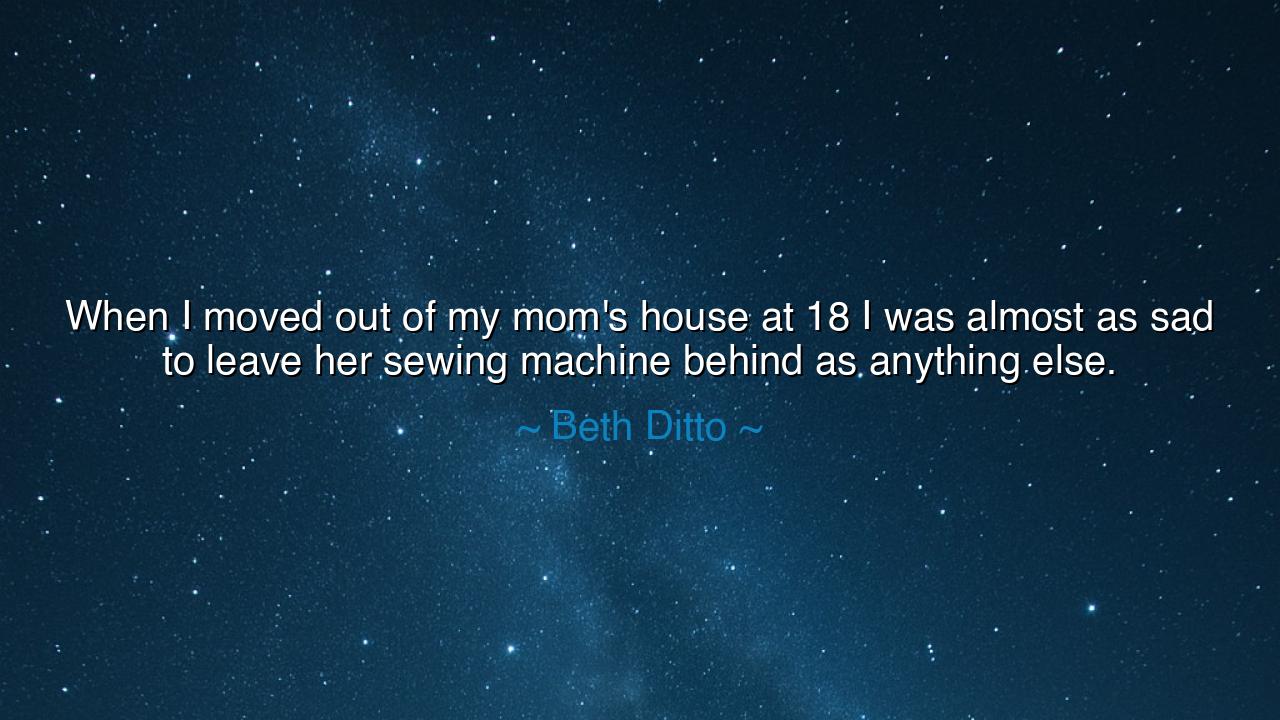
When I moved out of my mom's house at 18 I was almost as sad to
When I moved out of my mom's house at 18 I was almost as sad to leave her sewing machine behind as anything else.






“When I moved out of my mom’s house at 18 I was almost as sad to leave her sewing machine behind as anything else.” — thus spoke Beth Ditto, and her words are not merely a memory of youth, but a parable of roots, of identity, and of the quiet treasures that bind us to where we come from. In this statement lies the recognition that the tools of a parent, humble and ordinary, often hold as much weight in the heart as the house itself.
The mom’s sewing machine is more than an object. It is a symbol of care, of creativity, of survival. It is the hum of evenings where garments were mended, dreams were stitched, and love was threaded into fabric. To leave it behind was not simply to part with a machine, but to part with the sound of security, the rhythm of home, the symbol of a mother’s quiet heroism. The sadness Beth Ditto names is the sorrow of departing from that rhythm and stepping into the unknown world of adulthood.
This story calls to mind the tale of Mahatma Gandhi, who, in his youth, carried with him not the riches of empire but the spinning wheel, the charkha. It was a simple tool, yet it became the symbol of self-reliance and national identity. What seemed ordinary was, in truth, profound. In the same way, Ditto’s memory of her mother’s sewing machine reminds us that the humble instruments of daily life often carry the deepest meaning, for they hold within them the labor, love, and endurance of those who raised us.
The origin of this wisdom is found in the universal moment of leaving home. Every youth must one day walk out of the door, carrying only fragments of what formed them. Often, what clings most to the heart is not the grand furniture or the walls, but the intimate things: the smell of a kitchen, the sound of a familiar tool, the object that bore the weight of daily sacrifice. To remember the sewing machine is to remember the mother’s ceaseless work, her hidden artistry, her devotion expressed not in words, but in stitches.
There is also here a lesson about inheritance. To grow is to leave, and in leaving we discover what truly mattered. The child who once thought only of freedom later realizes that the greatest riches were in the things quietly given: the meals cooked, the clothes mended, the world held together by a parent’s steady hands. In naming the sewing machine, Ditto honors her mother’s legacy, and teaches us that memory is not kept in wealth, but in the symbols of love and labor.
The lesson is clear: cherish the small tools and acts that built your life. Do not overlook them as ordinary. For in truth, they are monuments—monuments of endurance, monuments of care, monuments of the invisible sacrifices that allowed you to rise. To leave them behind is to feel a wound, but to remember them is to carry their meaning forward.
Practical action follows: reflect on the objects or habits in your family that embody love and resilience. Do not cast them aside as trivial, but honor them, preserve them, and tell their stories. If you are a parent, let your daily acts of care remind you that they, too, will become symbols of memory for your children. And if you are a child, do not wait until you leave to recognize the power of what surrounds you now.
Thus Beth Ditto’s words, tender and evocative, carry the weight of an ancient truth: the mom’s sewing machine, though humble, is as sacred as an heirloom. For in its hum resided the spirit of home, and in its absence the young heart first knew the ache of departure. And so it is for all of us: when we leave, we take not everything, but enough to remember. And the memory of love, stitched into the fabric of our being, endures forever.






AAdministratorAdministrator
Welcome, honored guests. Please leave a comment, we will respond soon